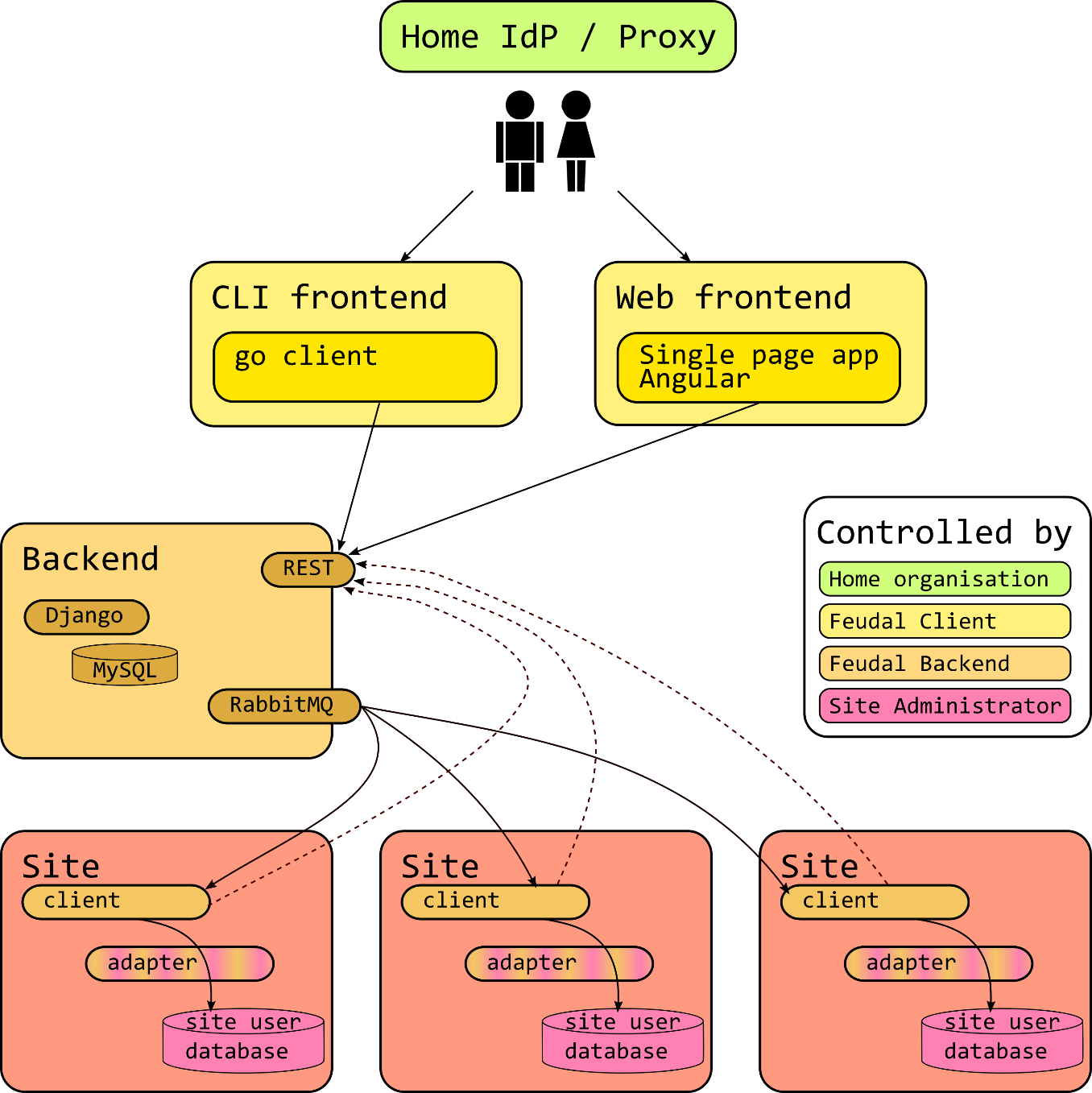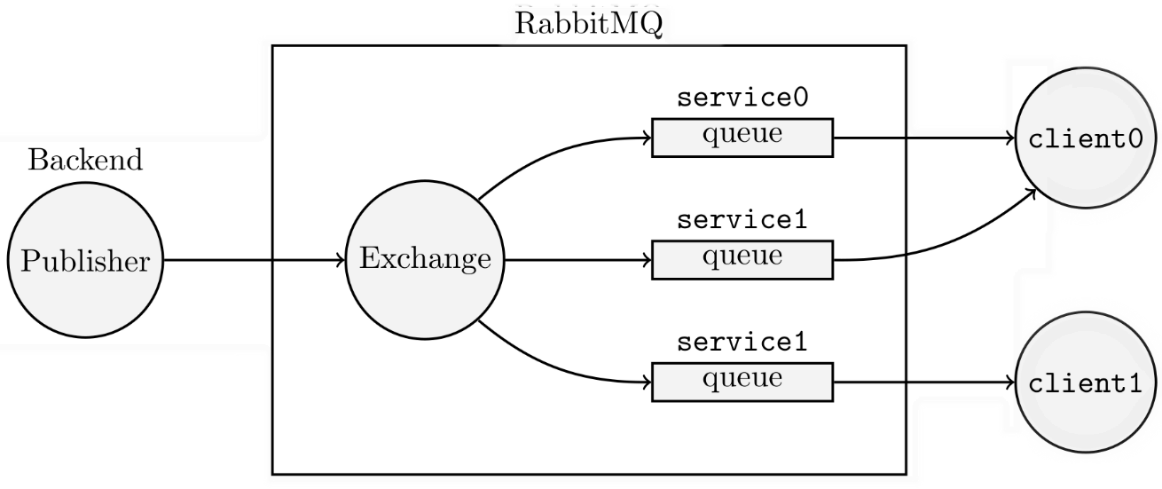FEUDAL
FEderated User Deployment portAL
Lukas Burgey, Uros Stevanovic, Marcus Hardt
November 2020
Feudal: User Provisioning
Goal
- Integrate non-federated services
- ssh, mysql, s3, ceph, ldap, …
- Provision local accounts, based on federated Identity
- Requirements:
- Respect Local site policies:
- Username policies
- Blocked users policies
- Deprovisioning / User updates
- Real-time requirements
- Respect Local site policies:
Our approach FEUDAL
- Backend
- Trigger (de)provisioning events to sites
- Store Status
- Frontend
- Web and commandline interface
- Communication with backend
- Client
- Obtain (de)provisioning events from backend
- Monitored execution of “Adapters”
- Adapters
- Implement (de)provisioning events into the local system
- Examples exist for
- Local accounts
- LDAP
- KIT user management (via REST Interface)
- Can be customised by site admin
FEUDAL Architecture

Messaging


- Rabbit MQ
- Low latency communication
- Clients only require outgoing connectivity
- Privacy-by-design: message-routing
- Fault Tolerance
- Clients register via REST
- Clients retrieve missed messages via REST
- Dynamic Infrastructure supported
- New clients (think VM, grid site, …) obtain all deployments
Technologies
- Backend: Django/Python
- Built-in admin and Database usage
- Django REST framework
- Frontend: Two REST Implementations
- Web: Angular / Typescript
- Asynchronous request handling
- Cmdline: Go
- Any other authorised (OIDC) user
- Web: Angular / Typescript
- Clients: Go
- Static linking for easier deployment to sites
- Adapters: Any language
- Three Python based adapters are provided
$localhostLDAP- KIT user management
- Three Python based adapters are provided
Integration
How to integrate your service
- Register a client with us
- Define the service(s) that you have
- Description of the service
- Adapter to use
- Define your authorisation scheme
- Virtual Organisations (VOs) to support
groupsoreduperson_entitlementclaims supported
- Virtual Organisations (VOs) to support
- Run the client
What does the client see?
- Incoming requests contain:
{
"state_target": "deployed",
"answers": {
"primary_group": "egi-eu_goc-egi-eu" },
"user": {
"credentials": {
"ssh_key": [
{ "id": 48,
"name": "id_ed25519.pub",
"value": "ssh-ed25519 AAAACa...dXg6ym/ marcus@nemo2019" } ] },
"userinfo": {
"eduperson_assurance": [
"https://aai.egi.eu/LoA#Substantial" ],
"eduperson_entitlement": [
"urn:mace:egi.eu:group:covid19.eosc-synergy.eu:admins:role=member#aai.egi.eu",
"urn:mace:egi.eu:group:eosc-synergy.eu:role=vm_operator#aai.egi.eu"],
"eduperson_scoped_affiliation": [
"faculty@KIT"
],
"eduperson_unique_id": "d7a53cbe3e966c53ac64fde7355956560282158ecac8f3d2c770b474862f4756@egi.eu",
"sub": "d7a53cbe3e966c53ac64fde7355956560282158ecac8f3d2c770b474862f4756@egi.eu",
"email": "hardt@kit.edu",
"preferred_username": "mhardt",
"family_name": "Hardt",
"given_name": "Marcus",
"iss": "https://aai.egi.eu/oidc/",
"name": "Marcus Hardt",
"acr": "https://aai.egi.eu/LoA#Substantial"
}
}
}Client has full control over provisioning decision!
What does the client see?
- If the client was offline for a while (or added to the VO later)
- ALL deployments are sent
- To make sure that a user that provisioned for all services of a VO will also be in this one
- Useful if you spin up VMs for the VO
- ALL deployments are sent
Authorisation
(sorry for being repetetive)
- Site admin has full control
- Will only be subscribed to the supported Virtual Organisations
- Can filter on assurance
- Example (from an adapter implementation):
prefix = https://refeds.org/assurance/ require = profile/espresso | IAP/medium & ID/eppn-unique-no-reassign | IAP/low & ID/eppn-unique-no-reassign | https://aai.egi.eu/LoA#Substantial | profile/cappuccino
Output
- Feudal features extensive logging (server and client)
- Clients can send json dictionaries
- Server displays key-value to the user
- Useful for informing the user about
usernamehostname
Questionnaire
- Clients can ask things back to the user
- Primary group
- Username already taken
Deprovisioning
- Fully supported
- If a use is removed from a group
- Feudal sends deprovisioning requests to all clients (that we know should have the user)
- Deprovisioning requires support by the SP-IdP-Proxy
- Current work: Specification for supporting this
- Works already with: Unity
Demo time
What you’ll see:
Log in to Feudal
Provision a user for a VO
Answer the questionnaire
Find username / hostname
Log in to the service
- Witness the group memberships
Deprovision the user (sorry, by hand for now)
- Can’t login anymore
Conclusion
Future work
- Establish service in production at KIT
- LSDF Storage Service
- Adapt to other community needs
- Features can be implemented on request:
- Support for password transports can be added
- Features can be implemented on request:
Feudal Summary
- Provisioning + Deprovisioning tool
- Scalable approach
- Virtual Organisation (VO) based
- “Growing VO” supported
- Fault tolerant provisioning
- Realtime deployments
- Rabbit-MQ / http sockets to push information
- Full control for integration
- Rich information sets available for sites
- Assurance, Entitlements, Groups, …
- Local administrators can filter users
- Rich information sets available for sites
- Commandline Support
- All features available via REST interface
Links
Productive Instance: https://feudal.scc.kit.edu
- Depending on your authorisation / assurance you can get a free ssh login!!
Gitlab: https://git.scc.kit.edu/feudal
Contact: m-contact@lists.kit.edu
Backup Slides
Message Content
- All info from Userinfo Endpoint
- FEUDAL adds:
- List of ssh keys
- Command (deploy / undeploy)
- Answers to questions (adapters may ask questions to the users)
- Messages to backend contain
- Questions
- Status (Success/Failure)
- Login information for the user
Solved Problems
- Site policy vs. user comfort:
- Username can be suggested by user
- Actual username will be generated by site and shown to the user
- Questionnaire mechanism allows “username already taken” scenarios
- Username can be suggested by user
- UID/GID is completely site policy
- Adapter is written / adjusted by local site admin
- Can add filtering:
- Blacklist users
- Specific UID range for local users (KIT does that)